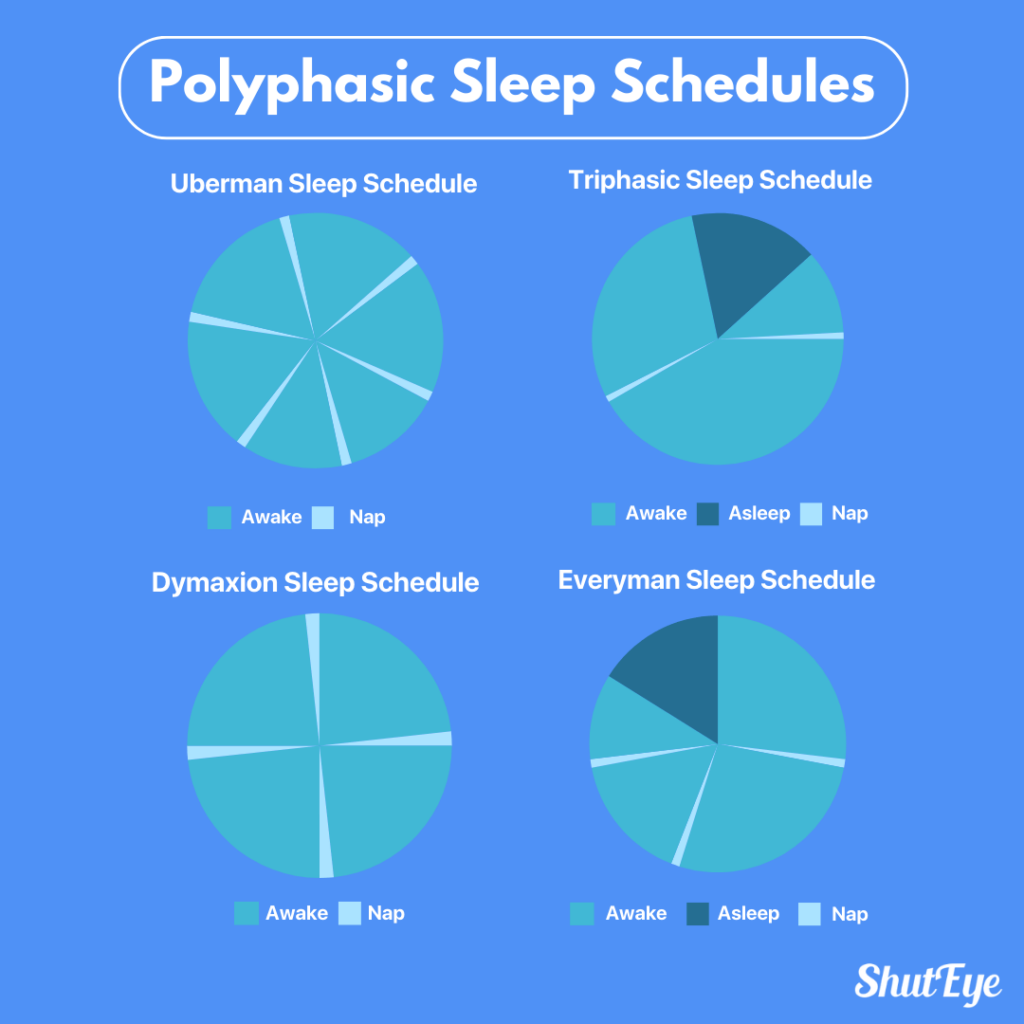


Imagine drowning in an endless sea of tasks, racing against deadlines, and hearing your mind scream, “I need more time!” Sound familiar? When there never seem to be enough hours in the day, it may feel tempting to experiment with your sleep schedule. Polyphasic sleep pattern is said to be an alternative method to getting more time out of your day.
But is it beneficial? Does it lead to poor sleep health? This article aims to explore what polyphasic sleep is, and the potential benefits and downsides of following such sleep patterns.
Polyphasic sleep pattern refers to a sleeping pattern in which a person may sleep for multiple periods of time throughout the day. It is different from monophasic sleep schedule which is when a person sleeps for one long period a day, typically at night.
In a polyphasic sleep pattern, individuals take several naps or shorter sleep sessions daily and at night, reducing the total hours of sleep needed. Common variants of polyphasic sleep include the Everyman, Uberman, and Dymaxion schedules.
Some reasons why someone may choose to follow this sleep pattern could be that they have an irregular sleep schedule, are shift workers, or who may have a “short sleep” gene [1]. While this sleep pattern may seem attractive for maximizing time, the total amount of sleep and the quality of that sleep can affect your mental and physical well-being.

There are several types of polyphasic sleep schedules with their own variations, typically falling below the recommended sleep duration of 7 to 9 hours for adults.
Here are some of the common types of polyphasic sleep schedules.
The Uberman sleep cycle or uberman sleep schedule involves reducing your amount of sleep to just 2 hours of sleep per day. The sleep pattern consists of dividing your sleep up into six, 20-minute naps throughout the day to maximize your time spent awake for productivity and alertness.
However, there is limited evidence that suggests this sleeping pattern can be beneficial in boosting your productivity and alertness levels.
The everyman sleep schedule consists of a core sleep period of a few hours and is supplemented by two, 20-minute naps during the day. Unlike the Uberman sleep schedule, having the core sleep period allows you to experience between 1 to 2 full sleep cycles, where you progress through the four stages of sleep.
These stages of sleep are important in helping your body to repair and grow tissues as well as improve your daytime performance.
The dymaxion sleep schedule consists of four, 30-minute naps evenly distributed throughout a 24-hour period, for a total of 2 hours of sleep per day. This means that you are napping for a total of 30 minutes every 6 hours. It is designed to maximize wakefulness and productivity but again, there are limited evidence to back this up.
The triphasic sleep schedule involves three equal-duration sleep periods spread throughout the day, usually consisting of a four-hour core sleep period and two 20-minute naps. It provides a balance between continuous sleep and shorter naps. This sleep schedule may be ideal for someone that has a typical 9 to 5 work schedule.
Many people adopt polyphasic sleep due to the benefits of increased productivity and alertness throughout the day. Some polyphasic sleepers often report feeling more energized and having improved cognitive function. This can lead to enhanced focus, memory retention, and learning abilities.
However, there is a lack of evidence to support these claims.

Adopting polyphasic sleep may have potential risks and side effects that you should be aware of. While polyphasic sleep patterns may seem appealing for maximizing your waking hours, it’s essential to consider the following risks [2]:
1. Disrupted circadian rhythm: Irregular sleep schedules can disrupt your body’s natural sleep-wake cycle, leading to difficulty falling asleep and waking up at the desired times.
2. Increased risk of sleep deprivation: Polyphasic sleep schedules can result in sleep deprivation and fatigue, negatively impacting your overall health and well-being.
3. Limited scientific evidence: Currently, there’s a lack of scientific evidence to support the benefits of polyphasic sleep over monophasic sleep patterns or biphasic sleep patterns. It’s best to stick to a regular sleep schedule as much as possible.
Before you try polyphasic sleep, it is essential to consider several factors. Switching to a polyphasic sleep schedule can significantly alter your regular sleep patterns and positively and negatively affect your sleep time and overall sleep quality. To help you make an informed decision, consider the following factors:
Considering these factors will help you determine if a polyphasic sleep schedule suits you. Remember to consult with a healthcare professional or sleep specialist before drastically changing your sleep routine.

Sleep plays a crucial role in maintaining your physical and mental health. It’s essential for various aspects of your well-being, including cognitive function, memory consolidation, and overall quality of life.
Sleep is important for a few key reasons which are:
Circadian Rhythm Regulation: Your body has an internal clock called the circadian rhythm, which regulates your sleep-wake cycle. Adequate and regular sleep helps maintain a healthy circadian rhythm, supporting optimal physical and mental functioning.
Restoration: During sleep, your body undergoes essential processes such as tissue repair, hormone regulation, and immune system strengthening. It’s when your body rejuvenates and prepares for the next day.
Memory and Learning: Sleep is essential for memory consolidation, helping you retain and generalize information. During sleep, your brain processes and integrates new knowledge, enhancing your ability to learn and remember.
Polyphasic sleep patterns may offer an alternative approach to structuring your sleep. However, it’s important to note that there’s limited scientific evidence to fully support these claims. Before making any changes to your sleep routine, consulting with a healthcare professional is always a good idea.
If you’re looking for a smarter, more personalized approach to sleep, the ShutEye® app is here to help. With features designed to optimize your sleep schedule and provide insights tailored to your needs, ShutEye® can guide you toward better rest and improved well-being. Try it today for free!
National Institutes of Health (2019) Gene identified in people who need little sleep [online]. Available at: https://www.nih.gov/news-events/nih-research-matters/gene-identified-people-who-need-little-sleep
Weaver, M. D., Sletten, T. L., Foster, R. G., Gozal, D., Klerman, E. B., Rajaratnam, S. M. W., Roenneberg, T., Takahashi, J. S., Turek, F. W., Vitiello, M. V., Young, M. W., & Czeisler, C. A. (2021). Adverse impact of polyphasic sleep patterns in humans: Report of the National Sleep Foundation sleep timing and variability consensus panel. Sleep health, 7(3), 293–302 [online]. Available at: https://doi.org/10.1016/j.sleh.2021.02.009